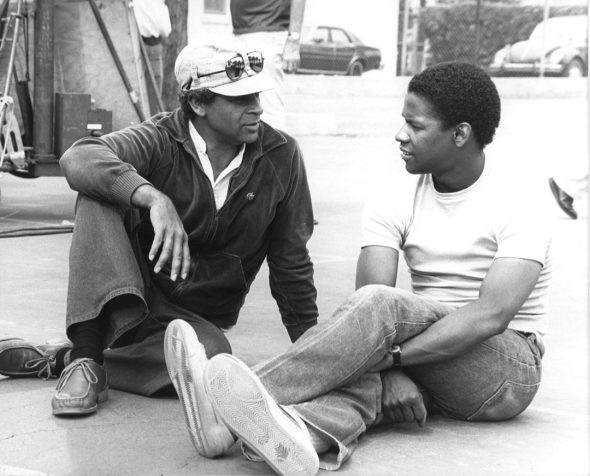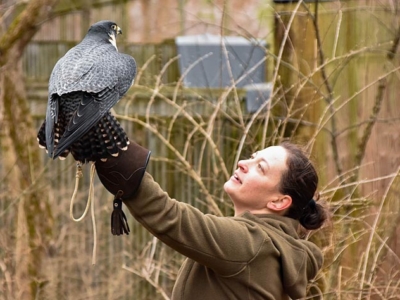
Director Michael Schultz and famed actor Denzel Washington on the set of the 1981 comedy/drama “Carbon Copy.” Before launching a storied directorial career, Schultz worked as a director at the Antioch Area Theater in Yellow Springs in the late ’60s. (Photo courtesy of Michael Schultz)
Film director Michael Schultz’s Yellow Springs connection
- Published: September 15, 2023
In a Sept. 2022 New York Times interview, film director Michael Schultz, known for iconic 1970s movies “Cooley High” and “Car Wash” and 1980s classics “Krush Groove” and “The Last Dragon,” described why he came to visit Yellow Springs in 1965 — a passage that piqued this reporter’s imagination.
“I had moved to New York after studying theater at Marquette in Milwaukee, where I grew up. My wife and I were working with the McCarter Theater in New Jersey when Douglas Turner Ward and Robert Hooks were just starting the Negro Ensemble Company. My wife suggested I drop my résumé off with them before we went on the road to do a play that she was acting in and I was directing. Douglas Turner Ward ended up coming out to Yellow Springs, Ohio, to see it and offered me any of the plays in the Negro Ensemble Company’s opening season.”
So, what exactly was Schultz’s connection to Yellow Springs?
The California-based Schultz, at age 85, has been directing for six decades. Born in Minnesota, Schultz started out in theater, and made his acting and directing debuts off-Broadway, before making the jump to directing films and television shows. In addition to his film credits, Schultz has over 100 television credits, having directed episodes of the hit shows “Black-ish” and “Manifest”; the rebooted “The Wonder Years”; and DC-comics-based shows “Arrow” and “Black Lightning,” to name a few. According to the New York Times, Schultz is also responsible for the film debuts of Hollywood actors Denzel Washington, Samuel L. Jackson and Blair Underwood.
As is often the case, it was through a professional relationship, this time with programming partner WCSU-FM, 88.1, that the News was able to secure an interview with Schultz to find out his connection to the village. WCSU General Manager Charles Fox had previously worked with Schultz on a diversity, equity and inclusion in film initiative with Schultz.
“The way it happened for us to be in Yellow Springs was a function of our being in the repertory company at Princeton, the McCarter Theater in Princeton, New Jersey,” Schultz told the News recently via Zoom.
“A classmate of mine came back from the Royal Academy [of Dramatic Art in London] and had a job as associate director of the McCarter Theater, and he asked me if I would join the company,” Schultz said. “I said, ‘Only if I can direct a play, and if you take me and my wife into the company. He said, ‘Okay, great.’”
Schultz, who was looking to direct, was offered a position with the McCarter Theater, a respected company that has been producing plays since 1930. At the time, former Yellow Springs resident Arthur Lithgow, father of actor John Lithgow, was running the theater.
“I wound up directing two plays at the McCarter Theater that got great reviews and wound up being in New York papers and all that stuff,” Schultz said.
Arthur Lithgow offered Schultz a directing job at the Antioch Area Theater’s summer festival. The festival drew actors from all over the world, and thousands to Yellow Springs. An article that appeared in the News two years after Schultz was hired, on Feb. 1, 1967, headlined the company’s celebration of 250,000 tickets sold over 10 years of performances at the college’s foundry theater and amphitheater.
“Arthur Lithgow said, ‘There’s this great summer festival in Yellow Springs; if you guys are interested in being in the company, I’ll work it out.’ And so, I said, ‘Yeah, I’m interested if I can direct one of the plays,’” Schultz said.
As Schultz was preparing for the play in Yellow Springs, The Negro Ensemble Company, or NEC, founded by the late playwright Douglas Turner Ward and actor Robert Hooks, was in the first trimester of development after receiving funding from the Ford Foundation. For over 56 years, the NEC has focused on works by Black playwrights that spotlighted the experiences of Black [African] people across the diaspora. The NEC has staged works by August Wilson, Suzi-Lori Parks, Charles Fuller and Nigerian playwright Wole Soyinka.
Before heading off to Yellow Springs, Schultz left his resume with Turner Ward, who briefly attended Wilberforce University in 1946 before becoming a playwright.
“We’re in Yellow Springs, and I get a phone call [from Turner Ward] saying, ‘I want to come down and see what you’re directing, and then let’s talk about the first season of the NEC,’” Schultz said.
The play Schultz was directing at the time was French playwright Jean Genet’s “The Balcony.” Staged at the amphitheater, the production included horses in the cast.
“[Turner Ward] comes down, watches the play, and then afterwards, we have a little meeting. He says, ‘We’re doing four plays for the inaugural season, here they are. Which ones do you want to direct?’” Schultz said.
Among the works offered to Schultz were Soyinka’s Kongi’s “Harvest,” as well as a play that was an urgent and angry indictment of the brutality of colonialism called “Song of the Lusitanian Bogey,” by the German playwright Peter Weiss — only it hadn’t been translated to English.
“Doug was getting it translated. … And he said, ‘Well, it’s about the Portuguese suppression of Mozambique and Angola.’ I said, ‘Great, that’s the one I want to do,’” Schultz said.
Schultz said he found someone in Yellow Springs to translate the play while he was here.
“I’ll find somebody who speaks German, and we’ll have them read it, and invite them over to lunch and find out what this play is about. And that’s exactly what happened,” Schultz said. “I found out it was a song play, that none of the characters had names. They were all numbers.”
According to Schultz, when he directed “Song of the Lusitanian Bogey,” theater in the 1960s related more to what was happening in real life outside of Broadway musicals.
“So, the theater had a direct connection to what was going on in our lives. To me, putting this story on stage was an important assignment for me as a director,” he said.
Schultz said it was his wife, Gloria Schultz — “the reason I am doing what I am doing” — who encouraged him to get in touch with Turner Ward in the first place. The two have been married for 58 years, and Schultz said his wife — who goes by the stage name Lauren Jones — has been one of the biggest influences in his life and career. Jones, a former Broadway actor, was also part of “The Balcony” production in 1965.
“I’m probably one of the luckiest guys on the planet to have run into her in New York. She was dancing in Broadway shows while I, on the same street in New York, was being an assistant stage manager in this off-Broadway play. … And I realized not only was she beautiful, but she was also really smart and super talented.”
When he first met Jones, Schultz said he had no intention of getting married.
“All these beautiful women were around. I was going to be a play boy of the western world,” Schultz said, laughing. “And then I met Gloria, and it was all over.”
Schultz said that after navigating a career on Broadway and in film, Jones decided to walk away from acting. As a Black woman, the scope of roles offered to her were limited. Jones played the kind-hearted prostitute, Marlene, in the movie “Car Wash.”
“She’s way more creative than I am. And more talented. But she decided after being in several Broadway shows and a couple of movies, ‘Well, I played a maid, a slave and a prostitute — ‘I think I’m done,”’ Schultz said. “There were no roles where she could display that talent.”
After giving up acting, Jones decided to concentrate on family — she and Schultz share two sons in addition to a Schultz’s son from a previous marriage. Later, the couple “decided to work together as much as we could with her having other roles. So, in my first Hollywood movie, “Cooley High,” she was the casting director. She went out and found all those kids. She found Robert Townsend [director and actor] and all those kids from the neighborhood.”
“We worked together making a screenplay out of Eric Monte’s [screenwriter of “Cooley”] stories, you know? It’s been a creative collaborative partnership in the best sense on everything I’ve worked on,” Schultz said.
The work continues.
Schultz is currently adapting the film “The Last Dragon” for the stage. This will be the second Hollywood film he directed that is making the leap to theater.
The theatrical production of “Cooley High” premiered at the African American Freedom Theatre in the late 1990s.
The Yellow Springs News encourages respectful discussion of this article.
You must login to post a comment.
Don't have a login? Register for a free YSNews.com account.













No comments yet for this article.